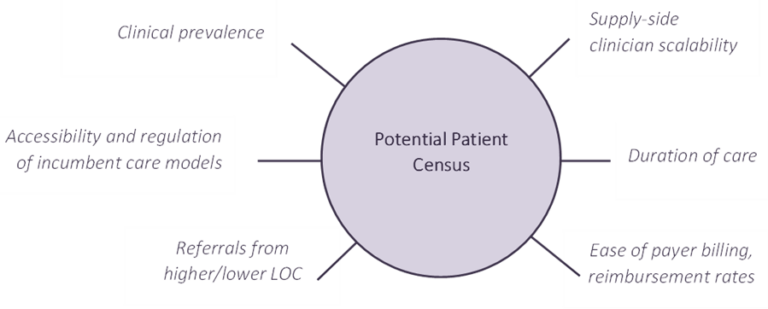Explosive Digital Health Investments Are Consumerizing Healthcare
Private investors have quickly caught onto the trend of digitalized healthcare, shifting the lens of the broader healthcare market to be more individualized and focused on healthcare consumers. In 2021 alone, investors poured ~$29 billion into digital health startups, nearly doubling the ~$15 billion invested in 2020. ¹
As more investors act in the space and see sustainable growth opportunities, founders have scored lofty valuations in early-stage deals, resulting in a seemingly expensive vertical. This trend often leads founders to ask if we’re truly passionate about digital healthcare models, or if we’re simply interested in investing in a hot space. Our candid answer is the former, and here’s why.
Lack of Convenience in Healthcare Hinders Patients from Receiving Treatment
Throughout the last several decades, heightened awareness of both the efficiency and the convenience of services have become a priority for consumers. The more readily available and less disruptive the proposed solution to my problem, the more likely I am to pursue the option in front of me.
The same goes with healthcare. For preventative care, non-life-threatening concerns, and many lower levels of behavioral health treatments, the less disruptive to my current lifestyle such care is, the more likely I am to pursue, or at least assess, the treatment options available to me.
I can’t help but ask how a doctor’s appointment at a physical location for a condition that can be treated remotely is either efficient or convenient? It’s often not, which is why, for example, nearly 2/3 of people with mental health disorders fail to receive any form of treatment for their condition. ²
Digital Healthcare Models Provide Generous Scalability of a Potential Patient Census
Digitalized healthcare solutions allow for the growth of a potential patient census, but unlike many consumer sectors, it’s often a result of more than simple sales and marketing spend. Instead, it’s the result of allowing consumers to integrate the necessary forms of healthcare into their everyday lives rather than interrupting routines to see a provider.
It’s encouraging patients afraid to seek treatment for stigmatized conditions to actively pursue care with the comfort of a private location. It’s maximizing provider capacity in a time of impending provider shortages. ³ Ultimately, it’s integrating medical and technological advances to keep our population healthy.

The Increasing Patient Census Provides Context for the Seemingly High Multiples Achieved in the Digital Health Vertical
This growth potential can dramatically increase the demand intensity of services for healthcare consumers, increasing the total addressable patient market for digital health startups and justifying the unfamiliar multiples in this category of consumer wellbeing. Therefore, we remain passionate about actively investing in digital healthcare models to improve the overall efficiency and convenience of treatment accessibility.
